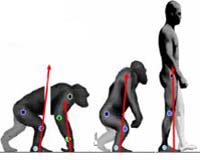| . |  |
. |
Paris, France (SPX) Mar 24, 2010 Once the human genome was sequenced in 2001, the hunt was on for the genes that make each of us unique. But scientists at the European Molecular Biology Laboratory (EMBL) in Heidelberg, Germany, and Yale and Stanford Universities in the USA, have found that we differ from each other mainly because of differences not in our genes, but in how they're regulated - turned on or off, for instance. In a study published in Science, they are the first to compare entire human genomes and determine which changes in the stretches of DNA that lie between genes make gene regulation vary from one person to the next. Their findings hail a new way of thinking about ourselves and our diseases. The technological advances of the past decade have been so great that scientists can now obtain the genetic sequences - or genomes - of several people in a fraction of the time and for a fraction of the cost it took to determine that first human genome. Moreover, these advances now enable researchers to understand how genes are regulated in humans. A group of scientists led by Jan Korbel at EMBL and Michael Snyder initially at Yale and now in Stanford were the first to compare individually sequenced human genomes to look for what caused differences in gene regulation amongst ten different people. They focused on non-coding regions - stretches of DNA that lie between genes and, unlike genes, don't hold the instructions for producing proteins. These DNA sequences, which may vary from person to person, can act as anchors to which regulatory proteins, known as transcription factors, attach themselves to switch genes on or off. Korbel, Snyder, and colleagues found that up to a quarter of all human genes are regulated differently in different people, more than there are genetic variations in genes themselves. The scientists found that many of these differences in how regulatory proteins act are due to changes in the DNA sequences they bind to. In some cases, such changes can be a difference in a single letter of the genetic code, while in others a large section of DNA may be altered. But surprisingly, they discovered even more variations could not be so easily explained. They reasoned that some of these seemingly inexplicable differences might arise if regulatory proteins didn't act alone, but interacted with each other. "We developed a new approach which enabled us to identify cases where a protein's ability to turn a gene on or off can be affected by interactions with another protein anchored to a nearby area of the genome," Korbel explains. "With it, we can begin to understand where such interactions happen, without having to study every single regulatory protein out there." The scientists found that even if different people have identical copies of a gene - for instance ORMDL3, a gene known to be involved in asthma in children - the way their cells regulate that gene can vary from person to person. "Our findings may help change the way we think of ourselves, and of diseases", Snyder concludes: "as well as looking for disease genes, we could start looking at how genes are regulated, and how individual variations in gene regulation could affect patients' reactions." Finally, Korbel, Snyder and colleagues compared the information on humans with that from a chimpanzee, and found that with respect to gene regulation there seems to be almost as much variation between humans as between us and our primate cousins - a small margin in which may lie important clues both to how we evolved and to what makes us humans different from one another. In a study published online in Nature yesterday, researchers led by Snyder in the USA and Lars Steinmetz at EMBL in Heidelberg have found that similar differences in gene regulation also occur in an organism which is much farther from us in the evolutionary tree: baker's yeast.
Share This Article With Planet Earth
Related Links European Molecular Biology Laboratory All About Human Beings and How We Got To Be Here
 Program Investigating If And How Past Climate Influenced Human Evolution
Program Investigating If And How Past Climate Influenced Human EvolutionWashington DC (SPX) Mar 08, 2010 Understanding how past climate may have influenced human evolution could be dramatically enhanced by an international cross-disciplinary research program to improve the sparse human fossil and incomplete climate records and examine the link between the two, says a new report from the National Research Council. Climate and fossil records suggest that some events in human evolution - such as ... read more |
|
| The content herein, unless otherwise known to be public domain, are Copyright 1995-2010 - SpaceDaily. AFP and UPI Wire Stories are copyright Agence France-Presse and United Press International. ESA Portal Reports are copyright European Space Agency. All NASA sourced material is public domain. Additional copyrights may apply in whole or part to other bona fide parties. Advertising does not imply endorsement,agreement or approval of any opinions, statements or information provided by SpaceDaily on any Web page published or hosted by SpaceDaily. Privacy Statement |